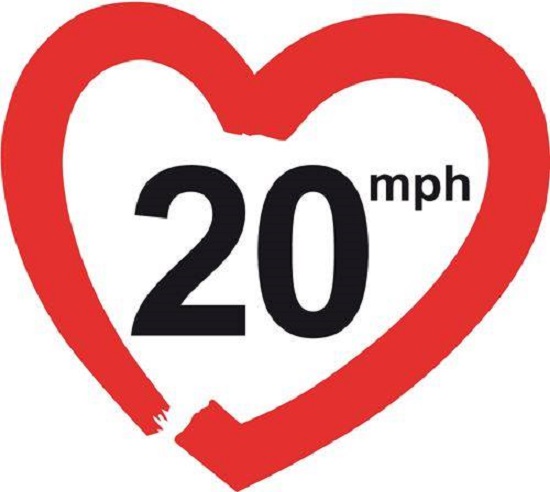
NICE recommends speed limits of 20mph to improve air quality
NICE, the National Institute for Health and Care Excellence, through its most recent publication for guidance on ‘Air Pollution: Outdoor Air Quality and Health’ [1], strongly supports urban speed reduction for better air quality.
Speed limits of 20mph, are increasingly acknowledged as an affordable tool to address air quality problems. Many authorities have set 20mph limits on roads with higher average speeds, for consistency of limits across a locality. Edinburgh, Glasgow, Hammersmith, Fulham and others have justified such area-wide limits, both in terms of health benefits, and due to promising behavioural change of commuters. As a result of the 20 mph limits, there are fewer casualties, and reduced acceleration which encourages a shift away from cars towards non-polluting active mobility choices- walking and cycling, which ultimately contribute to better air quality.
Rod King MBE, Founder of 20’s Plenty for Us said: “Many authorities recognise that 20mph helps them to both meet their air quality as well as ‘duty of care’ responsibilities to the vulnerable [2]. In fact switching to a 20mph limit makes a significant reduction in the most dangerous NOx and PM10 emissions [3]. It is entirely appropriate for NICE to make this recommendation to direct local authorities in their statutory duty to improve air quality and public health.”
NICE guidance advises authorities to set “20 mph limits without physical measures to reduce speeds in urban areas where average speeds are already low (below around 24 mph) to avoid unnecessary accelerations and decelerations”. NICE further advises that physical speed reduction measures, already in use for road safety purposes, can be used to encourage a reduced steady speed for longer stretches of road, and thus avoid emissions from acceleration and deceleration for road humps.
What is interesting is the call for not using physical speed reduction measures. This could be another argument in favour of vehicle safety systems like Intelligent Speed Assistance as standard in vehicles to provide lower speed limits and contribute to a better environmental driving technique. It has been well documented that aiding drivers to keep to the speed limit with an assisting, but intervening, ISA system can also improve driving with smoother acceleration and deceleration of the vehicle.
This technology, whereby the car knows the speed limit and applies a progressively harder pushback on the accelerator pedal when limit is exceeded, is already available in some cars. This is overridable but would decrease speeding and consequently drastically improve road safety.
ECF has been advocating for this technology to be included in the upcoming review of the vehicle safety type approval so that all new vehicles have this sort of technology. Improving air pollution through smoother driving is another excellent reason for implementing this technology in all new vehicles as soon as possible. You can read ECF position paper here.
Read the full press release by 20’s Plenty for Us here.
[1] https://www.nice.org.uk/guidance/ng70
[2] http://www.20splenty.org/duty_of_care_mandates_20mph
[3] http://www.20splenty.org/emission_reductions
Regions:
Contact the author
Recent news!
Upcoming events
Contact Us
Avenue des Arts, 7-8
Postal address: Rue de la Charité, 22
1210 Brussels, Belgium









